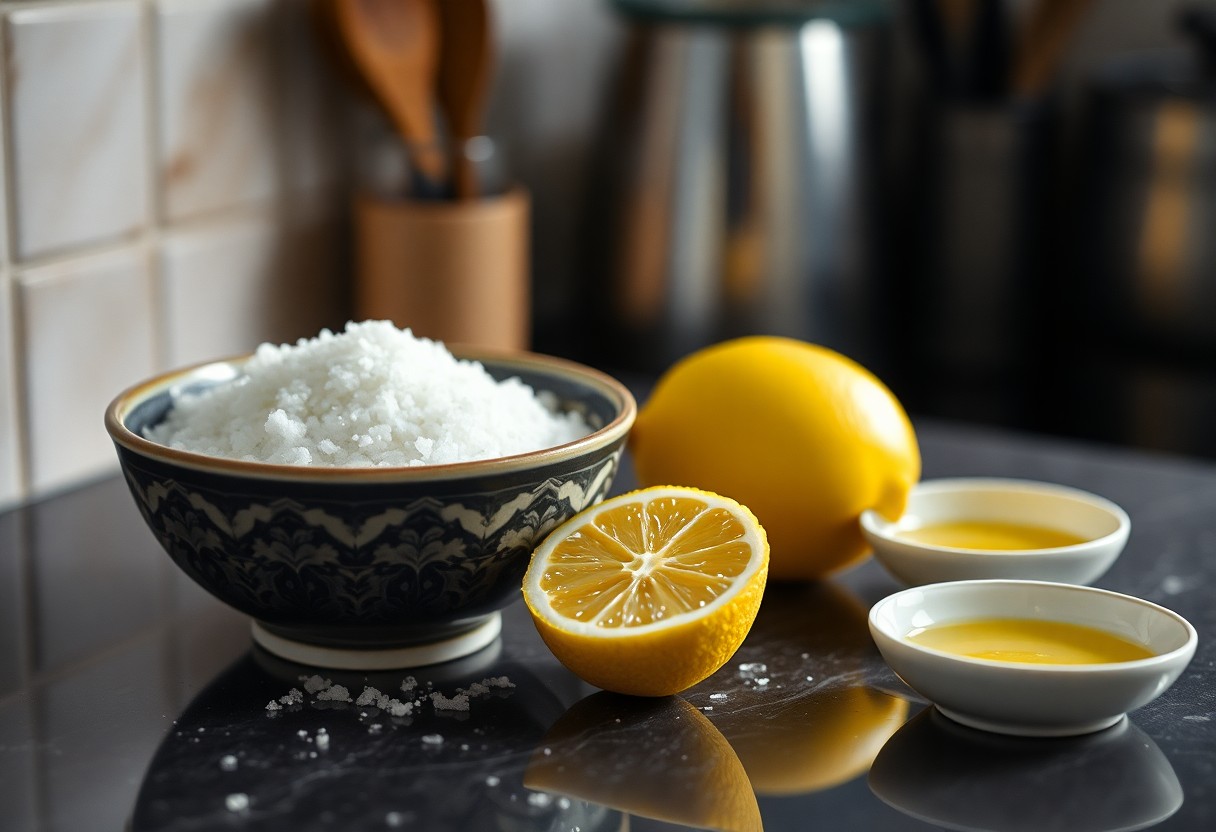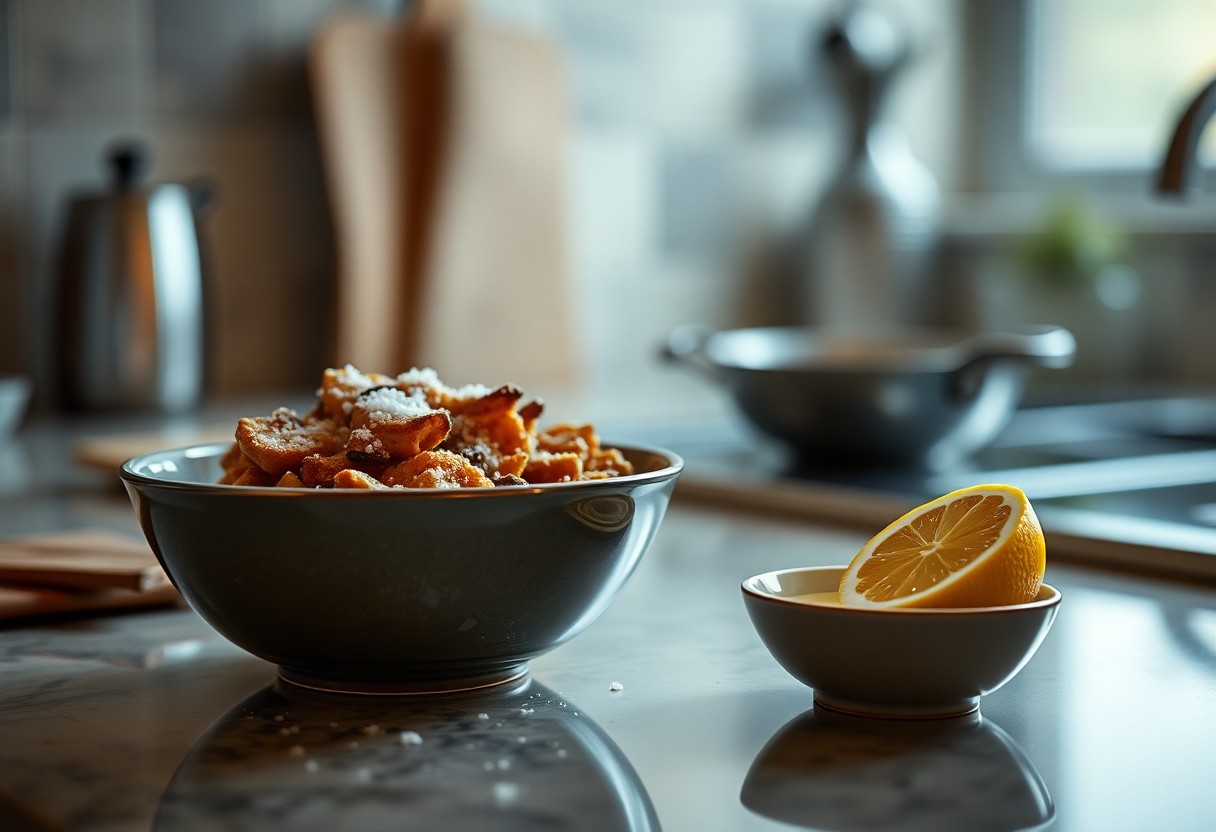Most people don’t realize that adding lemon juice to your dishes can help balance out excess saltiness. While it may not eliminate the salt flavor entirely, the acidity of lemon works to enhance the overall taste of your food, making it seem less salty. This can be especially useful if you accidentally over-season a meal. Just a splash of lemon can transform your dish and save your taste buds from an overpowering salty experience. So, the next time you find yourself with a salty recipe, consider reaching for the lemon to restore balance.
Key Takeaways:
- Lemon juice can enhance flavors and provide a bright contrast, potentially masking the perception of saltiness in dishes.
- Acidity from lemon can balance the overall taste, making a dish feel less salty without actually reducing salt content.
- Using lemon as a finishing touch or marinade can complement flavors and help to create a more harmonious taste profile in salty dishes.
The Chemistry of Flavor Perception
Flavor perception is a complex interplay between various tastes, aromas, and textures. Both salt and acid contribute significantly to how you experience food. Your brain interprets these signals through a combination of taste buds and olfactory senses, allowing for a rich tapestry of flavors that can enhance or mask certain elements, such as saltiness. Understanding this chemistry helps in mastering the balance of flavors in your cooking.
How Salt and Acid Interact
When you combine salt with acidity, such as lemon juice, their interaction can create a dynamic balance. Salt enhances the overall flavor profile of your dish, while the acidic component of lemon juice can mitigate the perception of excessive saltiness. This reaction allows for a more harmonious flavor experience, making food taste well-seasoned rather than overly salty.
The Role of Taste Buds in Detecting Flavor
Your taste buds play a vital role in how you perceive flavor. Each bud contains receptor cells that respond to different taste modalities, including sweet, sour, salty, bitter, and umami. When you consume a dish, the presence of salt stimulates specific receptors that signal its salty flavor. However, the introduction of acid, like lemon juice, can counterbalance this by activating sour receptors, helping to create a more pleasant overall taste.
The number and sensitivity of your taste buds can also affect how you detect varying flavors. Individuals with a higher density of taste buds may be more sensitive to saltiness and acidity. This means when you sprinkle some lemon juice on a salty dish, you might experience a greater reduction in perceived saltiness compared to someone with fewer taste buds. Understanding your own palate can guide how much lemon juice or other acidic components you might require to balance flavors without overwhelming saltiness.
The Culinary Impact of Lemons on Salty Foods
Lemons serve as a versatile tool in your kitchen, particularly when adjusting salty dishes. The natural acidity in lemon juice interacts with your taste buds, which can balance and even diminish the perception of saltiness. Many chefs rely on lemons in their cooking, using them in everything from seafood to salad dressings, not just for flavor but also for their ability to create a more harmonious dish. By incorporating lemon, you enhance the overall profile of your meals, encouraging a fresh, vibrant taste that can make high-sodium ingredients feel lighter and more balanced.
Techniques for Incorporating Lemon into Dishes
Integrating lemon into your meals can be done in numerous ways to maximize its benefits. You might drizzle fresh lemon juice over grilled vegetables, use the zest to brighten a pasta dish, or create a marinade for meats. Adding lemon at different stages of cooking—from pre-preparation to garnishing—can create layers of flavor, enhancing not only the taste but also the overall dining experience.
How Lemon Enhances Flavor Without Adding Sodium
Lemon achieves remarkable flavor enhancement through its bright acidity and complex flavor profile, which can effectively mask excessive saltiness in any dish. This is primarily due to its ability to stimulate your palate, offering a refreshing contrast that makes food taste fuller and more nuanced. By introducing lemon to a recipe, you create an impression of heightened flavor without the need for additional sodium, allowing you to enjoy meals with reduced salt without sacrificing taste.
The key to how lemon excels in flavor enhancement lies in its unique composition. The citric acid present in lemons invigorates your taste buds, heightened by natural sugars. This balance allows your food to taste more rounded and satisfying. For instance, marinades featuring lemon juice not only tenderize proteins but also impart a lively zest that counteracts overly salty notes, providing a more enjoyable culinary experience. This allows you to indulge in flavor-rich meals while keeping sodium intake in check—truly a win-win in healthy cooking.

Balancing Act: Lemons as a Salt Substitute
Lemons provide a zesty alternative to salt, enhancing flavor without the added sodium. When used effectively, lemon juice or zest can bring brightness and depth to dishes, making them taste fuller and more balanced. This tangy citrus can reduce the perception of saltiness, allowing you to enjoy savory meals while maintaining a healthier diet.
Comparative Analysis of Lemon Juice and Salt
Flavor Profile Comparison
| Component | Flavor Characteristics |
|---|---|
| Lemon Juice | Tart, acidic, enhances brightness |
| Salt | Salty, enhances umami, can overpower |
Real-World Examples of Lemon Use in Cooking
Incorporating lemons in your kitchen isn’t just about dressing salads; they shine brightly in a variety of dishes. For instance, a squeeze of lemon over grilled fish elevates the flavor profile, enhancing the natural taste without overwhelming it. Similarly, lemon zest can add a refreshing pop to baked goods, balancing out sweetness. In Mediterranean cuisine, you’ll find lemon juice acting as a marinade for meats, tenderizing while imparting a bright flavor.
Fish dishes, like lemon herb salmon, capitalize on the citrus’ ability to complement and elevate the flavors without needing excess salt. Similarly, a simple lemon vinaigrette can transform a mundane salad into a culinary experience, highlighting the freshness of your ingredients. In desserts, lemon bars and sorbets utilize their acidity to provide sharpness against sweetness, proving that lemons can masterfully balance flavors across various cooking styles.
Expert Insights: Chefs Weigh In
Professional Chefs Share Their Lemon Tips
Renowned chefs emphasize the role of lemon in balancing flavors to reduce the impact of salt in your meals. They recommend squeezing fresh lemon over roasted vegetables or fish, allowing the acidic notes to brighten the dish. Utilizing lemon zest can also add a layer of complexity without introducing additional salt. Experimenting with lemon in dressings and marinades often reveals its power to enhance without overpowering.
- Fresh lemon juice works wonders when drizzled on salads.
- Lemon zest can elevate sauces and dips.
- Pairing lemon with herbs creates a vibrant flavor profile.
Thou, you’ll find that these simple techniques can remarkably shift your perception of salt.
The Culinary Tradition of Using Acid in Savory Dishes
The incorporation of acid in savory dishes has deep historical roots in culinary traditions worldwide. Cultures have long harnessed the bright, zesty flavors of citrus, vinegar, and wines to create balance and depth. For example, in Mediterranean cuisine, lemon juice complements rich oils and fatty meats, effortlessly cutting through heaviness. Additionally, balancing flavors with acidic elements is a time-tested technique for chefs to enhance taste without relying solely on salt. The use of lemon in cuisines like Thai, where lime is prevalent, showcases its universal applicability for lifting flavors. Ultimately, understanding these traditions can transform your cooking approach and help elevate your meals beyond reliance on salt.

Practical Applications for Home Cooks
Incorporating lemon into your cooking isn’t just about adding flavor; it’s a practical way to manage saltiness in your meals. Whether you find a dish too salty or are simply looking to enhance its overall taste, lemons can provide a refreshing twist. This section will guide you through everyday recipes that benefit from lemon’s zing and practical tips for adjusting salt levels.
Everyday Recipes That Benefit from Lemon’s Zing
Many everyday recipes can greatly benefit from the sharpness of lemon. For instance, a simple lemon vinaigrette can elevate a salad that seems overly salty by balancing flavors. Similarly, adding lemon juice to pasta dishes or roasted vegetables can mask excess salt while enhancing the overall taste profile in a delightful way.
Tips for Adjusting Salt Levels with Lemon
Achieving the right balance of flavors often involves a few key techniques. When dealing with overly salted dishes, try adding fresh lemon juice gradually, tasting as you go. A sprinkle of lemon zest can also contribute to the flavor without additional liquid. Pairing lemon with herbs like basil or dill enhances the effect and rounds out any sharpness in flavor.
- Incorporate lemon juice and zest to lift flavors
- Taste as you adjust to prevent overpowering
- Use lemon with fresh herbs for balanced flavor
The combination of lemon and herbs provides a rich array of flavors that can distract from excessive saltiness. Consider using it in soups, stews, or even seafood to brighten the dish and mellow the salty essence.
- Try adding lemon in small increments for best results
- Use a combination of lemon juice and zest for maximum flavor
- Test pairing lemon with a hint of honey or sugar to counteract salt
The key is to experiment with your cooking to discover the perfect balance that suits your palate. Adjusting the elements in your dishes can transform a recipe into something enjoyable, even if it initially seems overly salty.
Conclusion
Hence, incorporating lemon into your dishes can effectively reduce the perception of saltiness. The acidity of lemon juice balances flavors, allowing you to enjoy a well-rounded meal without overwhelming salt levels. By using lemon as a flavor enhancer, you can create a healthier dining experience and potentially reduce your overall sodium intake. Experimenting with lemon in your cooking can lead to delightful discoveries and improved taste in your culinary creations.
FAQ
Q: Can lemon juice counteract too much salt in a dish?
A: Yes, lemon juice can help balance out the flavors in a dish that has become too salty. The acidity of the lemon can brighten the overall taste and distract from the saltiness, making the dish taste more harmonious. However, it does not actually reduce the salt content; it simply alters your perception of it.
Q: How does acidity, like that from lemon, affect the taste of salty food?
A: Acidity can enhance the perception of other flavors while softening the sharpness of saltiness. When lemon juice is added to a salty dish, it can create a more rounded flavor profile. The tartness can balance the salty taste and prevent it from overwhelming the palate.
Q: Are there other ingredients besides lemon that can help with salty dishes?
A: Yes, many ingredients can help mitigate saltiness, including vinegar, sugar, or even dairy products like cream or yogurt. Adding vegetables or starches such as potatoes or rice can also absorb some salt and dilute the overall saltiness in the dish.
Q: Is there a specific ratio of lemon juice to use when trying to reduce the salty taste?
A: There is no strict ratio, as it largely depends on the dish and personal preference. Start by adding a small amount of lemon juice—around half a teaspoon—and taste the results. Gradually increase the amount as needed until the flavors are balanced to your liking.
Q: Can overusing lemon make a dish taste worse than the saltiness?
A: Yes, overusing lemon can lead to an overly acidic taste that might overshadow the dish’s original flavors. It’s important to find the right balance when incorporating lemon. Start with a little, taste, and adjust incrementally to ensure the acidity complements rather than overwhelms your food.
